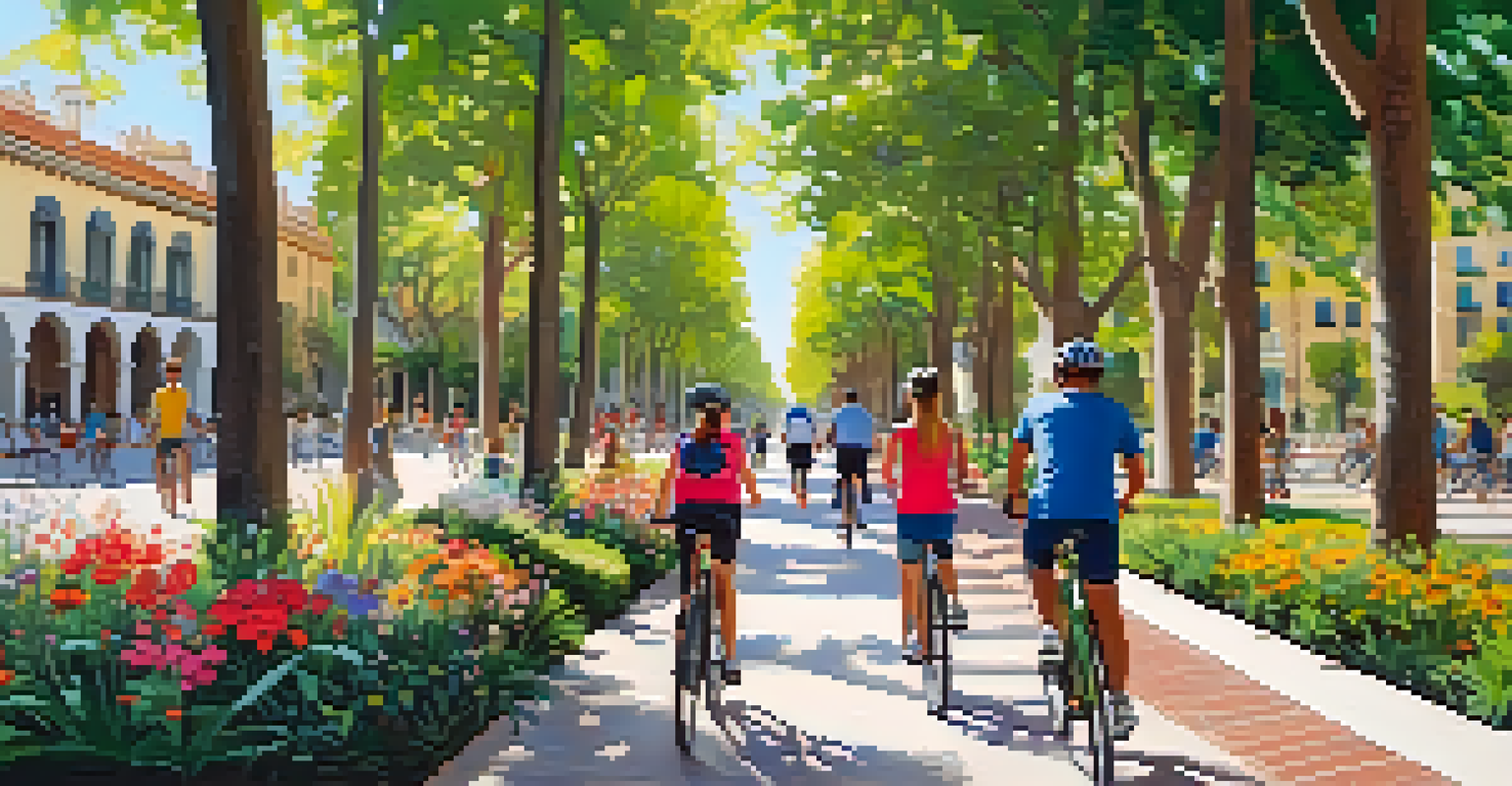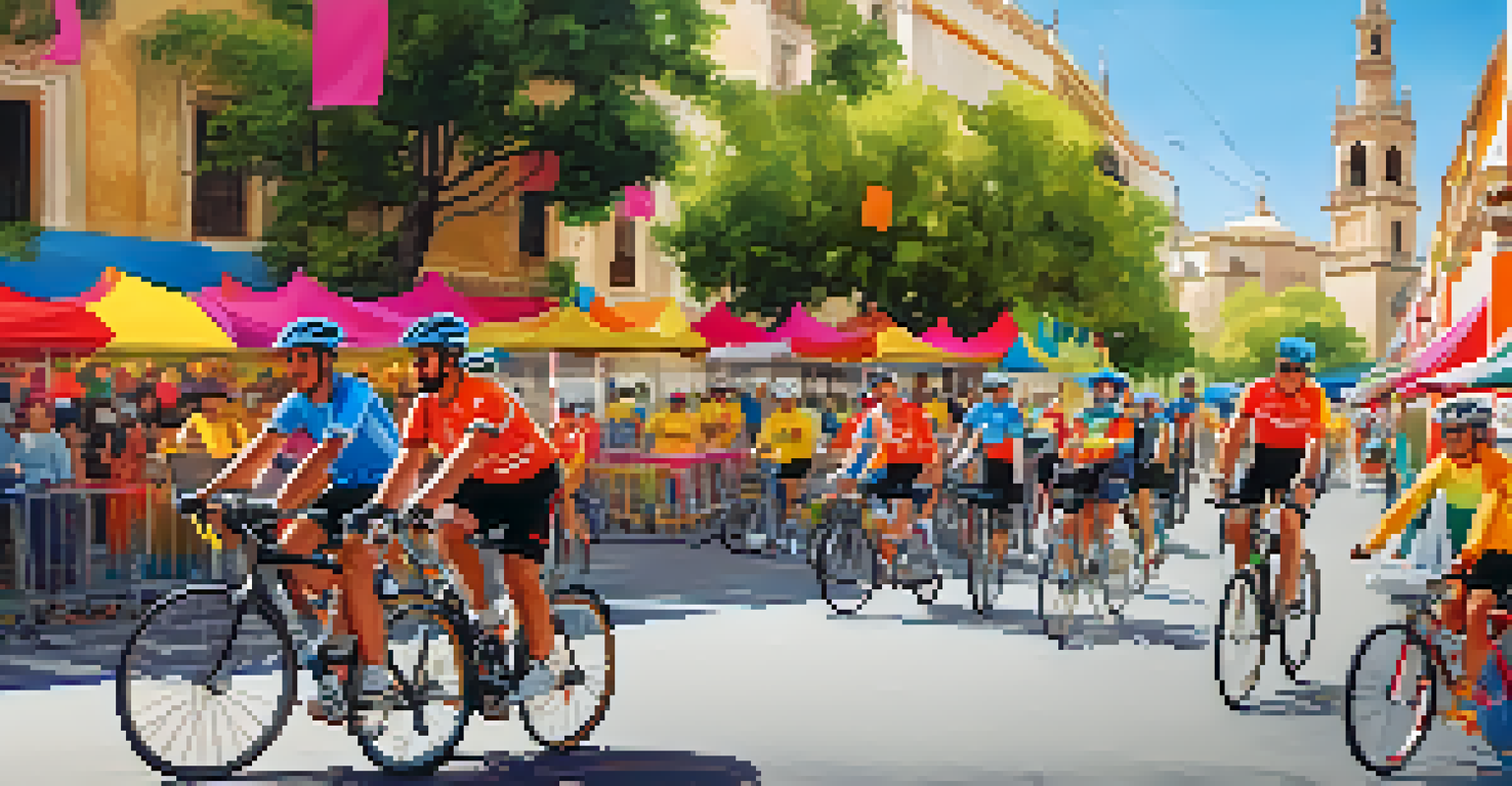The Rise of Bicycle Culture in Spain: Cities Leading the Way

The Growth of Bicycle Culture in Spain
Spain has seen a remarkable shift in transportation preferences over the past decade, with bicycles becoming increasingly popular. This change reflects a broader global trend towards greener, more sustainable modes of transport. The rise in bicycle culture isn’t just about convenience; it’s also about fostering a healthier lifestyle and reducing carbon footprints.
Bicycles are a simple solution to some of the world's most complex problems.
Cities across Spain have been implementing policies that encourage cycling, supported by both government initiatives and grassroots movements. This has resulted in more bike lanes, rental programs, and community events celebrating cycling as a viable mode of transport. As a result, bicycles have become a symbol of urban mobility and environmental consciousness.
Moreover, the COVID-19 pandemic accelerated this trend, as people sought safer alternatives to public transport. Many individuals discovered the joy of cycling, leading to increased demand for bike infrastructure. This surge is not just a fleeting moment; it's a pivotal change in how Spaniards view their cities and daily commutes.
Barcelona: A Model for Urban Cycling
Barcelona stands out as a leading city in promoting bicycle culture, with an extensive network of bike lanes and cycling initiatives. The city has transformed its streets to prioritize cyclists, making it easier and safer for residents and visitors to navigate on two wheels. This commitment has positioned Barcelona as a model for urban cycling worldwide.

The Bicing program in Barcelona allows residents to rent bicycles from various stations across the city, reinforcing the accessibility of cycling. This system not only encourages locals to cycle but also attracts tourists looking for an eco-friendly way to explore the city. With over 6,000 bikes available, it has significantly contributed to the rise of cycling as a popular mode of transport.
Bicycle Culture Thrives in Spain
Spain is witnessing a surge in bicycle culture, driven by sustainability goals and government initiatives.
Additionally, local government campaigns promote cycling awareness and safety, further embedding cycling into the city's culture. Events like 'Bicycle Day' celebrate this vibrant community, encouraging more people to hop on a bike. The city's efforts illustrate how comprehensive planning can foster a cycling-friendly environment.
Madrid: Embracing Cycling for the Future
Madrid has recently embraced cycling as part of its broader sustainability goals, aiming for a cleaner, greener city. The expansion of bike lanes and pedestrian zones has transformed the urban landscape, allowing cyclists to navigate the city safely. This shift is part of Madrid’s commitment to reducing air pollution and enhancing the quality of life for residents.
Cycling is not just a mode of transport; it's a way of life that promotes health and sustainability.
The 'Madrid Cycle Network' initiative has been instrumental in creating a comprehensive system of bike lanes. This network not only connects key city areas but also integrates with public transport, making it easier for cyclists to combine different modes of travel. The aim is to encourage more residents to choose cycling over cars for their daily commutes.
In addition, community programs and events promote cycling throughout the city, fostering a sense of belonging among cyclists. Madrid's efforts showcase how urban planning and community engagement can create a vibrant bicycle culture, paving the way for a sustainable future.
Valencia: The Green City on Wheels
Valencia has earned a reputation as one of Spain’s most bicycle-friendly cities, with a robust network of cycling paths that span the city. The city’s commitment to sustainable transport is evident in its extensive bike-sharing program, which encourages both locals and tourists to explore on two wheels. Valencia's flat terrain makes cycling an appealing option for everyone, from families to commuters.
In recent years, Valencia has invested significantly in expanding its cycling infrastructure. The city has increased the number of bike lanes and introduced measures to ensure cyclist safety, such as dedicated crossings and traffic calming. This infrastructure development is not only practical but also promotes a cultural shift towards cycling as a primary mode of transport.
Cities Lead Cycling Initiatives
Cities like Barcelona and Seville are setting examples with extensive bike lanes and community programs that promote cycling.
Community events, such as the 'Valencia en Bici' day, further enhance the visibility and enjoyment of cycling. These gatherings foster camaraderie among cyclists and encourage newcomers to embrace this eco-friendly lifestyle. Valencia's efforts exemplify how a city can transform its transportation culture through thoughtful planning and community involvement.
Seville: Pioneering Bicycle Infrastructure
Seville has taken significant strides in establishing itself as a cycling pioneer in Spain. With an impressive network of over 170 kilometers of bike lanes, the city has made cycling an attractive option for daily commutes. This extensive infrastructure has led to a remarkable increase in the number of cyclists on the road, showcasing the potential of investing in bike-friendly environments.
The city’s bike-sharing program, Sevici, has also played a crucial role in popularizing cycling among residents and visitors. With easy access to rental bikes, many people now incorporate cycling into their daily routines. This initiative reflects Seville's commitment to promoting sustainable transport and reducing reliance on cars.
Moreover, Seville’s approach to cycling includes educational campaigns aimed at raising awareness about road safety and the benefits of cycling. Events and workshops engage the community, encouraging more people to embrace bikes as a primary mode of transport. Seville's proactive measures highlight how a city can transform its transportation landscape through innovation and community engagement.
Cultural Shifts: Cycling as a Lifestyle
As bicycle culture flourishes in Spain, it brings with it a significant cultural shift. Cycling is increasingly seen not just as a mode of transport but as a lifestyle choice that promotes health, sustainability, and community. This transformation is reflected in the growing popularity of cycling events, clubs, and social gatherings that celebrate this vibrant culture.
Community rides and cycling festivals foster connections among cyclists, encouraging a sense of belonging and shared values. These events often feature local artisans, food vendors, and live music, creating a festive atmosphere that attracts people of all ages. Such gatherings not only promote cycling but also highlight the importance of local businesses and community spirit.
Challenges to Cycling Growth
Despite progress, Spain faces challenges such as safety concerns and insufficient infrastructure that need to be addressed.
Furthermore, the rise of bicycle culture has inspired collaborations between local governments and organizations to enhance cycling infrastructure. From educational programs to urban planning initiatives, the focus is on creating a supportive environment for cyclists. This cultural shift underscores the broader societal movement towards sustainability and healthier living.
Challenges Ahead: Overcoming Barriers to Cycling
Despite the positive momentum, several challenges remain in fully embracing bicycle culture in Spain. Issues such as safety concerns, insufficient infrastructure in some areas, and public attitudes towards cycling can hinder progress. Addressing these challenges is essential to ensure that cycling becomes a viable option for everyone, regardless of their background or ability.
Safety is often cited as a primary concern for potential cyclists, particularly in urban areas with heavy traffic. To combat this, cities need to enhance their cycling infrastructure and implement safety measures such as dedicated lanes and traffic regulations that prioritize cyclists. Raising awareness and promoting a culture of respect for all road users is also crucial in alleviating these concerns.

Additionally, ongoing community engagement and advocacy are vital in overcoming cultural barriers. Encouraging more people to share their cycling experiences and promote the benefits of cycling can shift public perception. By addressing these challenges head-on, Spain can continue to nurture its burgeoning bicycle culture and create a healthier, more sustainable future.